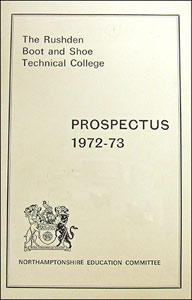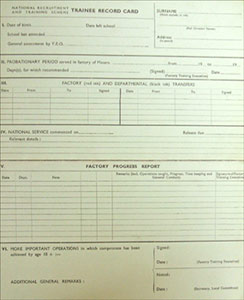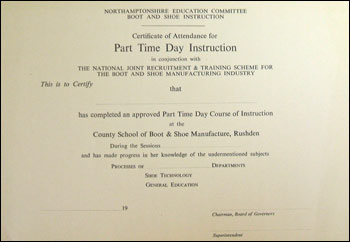|
|||||||||||||||||||||||||||||||||||||||
| Taken from the 1972 - 1973 prospectus for the Boot and Shoe Technical College held by Northampton Museum |
|||||||||||||||||||||||||||||||||||||||
|
Rushden Boot and Shoe Technical College, 1972 – 1973
|
|||||||||||||||||||||||||||||||||||||||
|
|||||||||||||||||||||||||||||||||||||||
|
|||||||||||||||||||||||||||||||||||||||
|
The College was situated in Victoria Road where instruction was concentrated for this part of the county, following the discontinuation of classes in boot and shoe manufacture at Kettering College in 1971 apart from classes in upper closing. The Prospectus for 1972 – 1973 boasted that in recent years a major programme of machinery renewal at the College had been carried out, supplemented by annual grants from the Northamptonshire Footwear Manufacturer’s Association, and the College now included very modern accommodation and equipment for design and pattern cutting, pattern making, clicking, closing, bottom stock cutting and preparation, lasting, attaching, finishing and shoe room work as well as a science laboratory, lecture rooms and provision for both day and evening classes. A complete range of representative machinery and equipment by the British United Shoe Machinery Co., The Singer Sewing Machine Co., and other companies was available for students’ instruction. The College also had an excellent library of reference books. A wide range of courses was available at the College. In brief, these included: Pre – Senior Full Time Course. This was a one year full time course for boys and girls leaving school and providing preliminary training for boot and shoe manufacture with continued general education. Secondary Transfer Course. This course was aimed at boys and girls making their last year of attendance at Secondary type schools. Students transferred to the Boot and Shoe Technical College one day a week for instruction in shoemaking. Day Release Courses. Two were available.
2 Attendance for 2, 3 or 4 half days a week to receive instruction leading to the Advanced Certificate examination. British Boot and Shoe Institute Course for candidates wishing to qualify for membership of the Institution. Success in the exams taken at the end of the third, fourth and sixth years of evening attendance qualified the candidate for Student and Associate grades of membership respectively. Craftsmanship Course, a two year evening course of practical instruction alone, based on the work of a particular department. Supervisory Studies Course, a one year day and evening course for potential and practicing foremen, charge hands etc which led to the new Certificate in Supervisory Studies. Departmental Management Course provided for advanced evening class students only who wished to receive instruction in the management of the department they were particularly concerned with in the factory. Specialised Management Course, an evening course of study provided for senior personnel wishing to expand their experience of costing and work study as applied to the shoe industry. The subjects could be taken either separately or together. Managers and Foreman’s Course for practicing departmental foremen and other operatives. It provided a review of current developments and trends in the fields of materials, processes and management for production.
Non Certificate Courses For boys, instruction is carried out in block releases of staggered attendances. Alternatively part time attendance one day a week may be arranged. Boys are grouped according to the department in which they are employed in the factory and are given the opportunity of specialising in one or two practical operations. For girls, instruction is carried out by part time attendance on one full day or two separate half days a week in practical, technical and related subjects. Instruction for both boys and girls is designed to provide a technical background to the practical work of the various departments and to develop the ability and skill of the students in specific practical operations.
Tests are set during the course and progress reports are issued to employers. Prizes are awarded by the Manufacturers Association and by individual employers on the results of the Annual Examinations. Students are issued with attendance cards on which their attendance is noted and all students completing the full course receive a certificate. Students attending the first year of their classes are allowed to attend one evening class a week for further practical work and instruction. Second year students will be expected to join the evening class course.
The instruction shall comprise general shoe technology and practical work with educational and management subjects, and will lead to the Advanced Stage exams in Boot and Shoe Manufacture of the City and Guilds of London Institute. Attendance will be required for one or two whole days a week:
City and Guilds of London Institute Course The course of instruction is arranged in four grades – Basic, Higher, Advanced and Full Technological, and should normally occupy at least three years part time study for Basic and Higher, and a total of not less than 150 hours study for Full Technological. The content of the courses is:
Examinations for the Basic certificate consist of one two hour written test and a practical test on an application selected by the candidate. For the Higher certificate there is a three hour written test and a practical test on two applications selected by the candidate. The Advanced examination has two three hour written tests and a practical test on three operations selected by the candidate. The Full Technological examination consists of two three hour written tests and a practical test on either departmental management or pattern cutting. The practical tests can take place either at the factory where the candidate is employed, or at the Technical College attended. British Boot and Shoe Institute Course Membership of the above institution may be attained by technical students who have attended an approved technological course including applied science. They must have attended an approved course and passed the examinations in technology, management and science. Membership is divided into Student, Graduate, Associate and Fellow. Student membership may be obtained by persons not less than 17 years old undertaking an approved course of study, Graduate by persons who have passed the City and Guilds Advanced or Full Technological examinations or the Institute’s own examination for Graduate ship, although this category is in the process of change. Associate membership is for persons over the age of 21 who have passed the Institute’s own examinations for Associate ship, which have recently been revised. Students desirous of qualifying for the Associate grade by the Institute’s own examinations will be enabled to do so at the end of the 4th year of attendance at the senior evening course. Registration for the Associate examinations themselves will require a further two years of study, attendance being requires two or three evenings a week. Certificate Course in Supervisory Studies This is provided in conjunction with the National Examination Board in Supervisory Studies and is a one year course of part time attendance at the college either one half day or two evenings a week. A full time residential weekend is also involved. Candidates should be not less than 21 years of age. During the course, students will be expected to carry out a project within the prescribed syllabus and submit a report which will form the basis for part of the examination. The syllabus covers the elements of supervision, techniques of work planning and control, communication, practical aspects of supervision, and the economic and financial aspects of supervision. Examinations will be two written tests of two hours duration and an oral test. The National Examination Board in Supervisory Studies will award the Certificate of Supervisory Studies to successful candidates. Senior Evening Course leading to City and Guilds of London Institute and the British Boot and Shoe Institute examinations. Classes will be arranged as follows: For the Basic stage attendance will be required one evening a week for lectures and demonstrations covering the technology of footwear manufacture of an introductory nature. A second evening class in practical instruction may be taken but is not required for the examinations. For the Higher stage attendance on two evenings is required. One evening furthers the technology learnt in the previous stage while the second is devoted to practical instruction in the operation of the student’s own choice. For the Advanced stage, three evenings a week provide a detailed study of the technology and processes of footwear manufacture delivered in the lecture class. Science is introduced to the materials studies on the second evening and continued instruction and experience in practical work of the student’s department is provided on the third evening. Advanced (Graduate) level requires attendance on three evenings again. On one, a more detailed study of the properties of materials and related science, including the importance of research, is undertaken. On another, a treatment of the principles of management and departmental supervision in factory conditions is dealt with. Candidates taking the City and Guilds Full Technological course attend a third evening on practical work while those taking the BBSI Graduate course learn about shoe technology. British Boot and Shoe Institute Associate stage, years 3 and 4 covers the five examination papers by two or three evenings attendance when candidates may choose from the following subjects: Footwear manufacture – development and trends Testing of materials Work study Factory planning and layout Industrial management Production organisation Craftsmanship course A two year course of practical work intended for candidates wishing to develop their skills at particular operations. Practical instruction is given in the processes of Design and Styling, Pattern Cutting, Pattern Grading and Making, Clicking, Closing, Bottom Stock, Machine Lasting, Making – Goodyear Welted, Cemented and Injection Moulded, Machine Finishing and Shoe Room work. More than one process may be studied depending on the number of attendances made each week. Examinations are held at the end of the first and second terms when the standard required to pass will be set at Intermediate level. Managers and Foremen’s Study Course A fortnightly meeting of adult foremen who may or may not have completed the full course of boot and shoe manufacture but who hold positions of executive responsibility in a shoe factory. The subjects dealt with are related to the more advanced aspects of production and management together with research and development. The meetings take the form of lectures by guest speakers, discussions and demonstrations. Factory visits are also arranged to study production organisation methods and techniques. They provide excellent opportunities for executives to keep abreast of current trends in the footwear industry. The night of attendance is arranged to suit the majority of students attending. Specialist Management Course There are two options in this course: Work Study – a one year class held fortnightly or in blocks of attendance to provide an appreciation of the nature and techniques of this too of management as applied to the footwear manufacturing industry. The course will deal with the analysis of tasks and the application of quantifying techniques, the interpretation of data, formulation and the installation of new methods, motion study and its’ uses, flow process charting, time study and activity sampling, work study techniques and their relationship to production. Costing – this will be a fortnightly or block release course alternating with the work study course. The subject will be dealt with in relation to the footwear industry and will cover elements of cost, classification of accounts, costing of upper materials, costing of bottom materials, calculation and control of labour costs, variable expenses, the final estimate, standard costing and budgetary control. These are both non-examination course. Special Courses Employers, executives, prospective students and other interested persons are invited to enquire about the provision of special courses. Arrangements will be considered for the use of college staff, workshops, laboratories, reference library and equipment in an endeavour to meet the particular needs of the industry and those associated with it. Residential courses at Grendon Weekend courses for boys and girls may be arranged during the 1972 – 1973 session. They will be held at Grendon Hall County Youth Centre and are designed to provide young people with an opportunity to get into focus many of the challenges and problems associated with earning a living. The programmes cover a range of topics of interest to young people and include recreational facilities. Prizes
The County Council offered competitive prizes open to all students who made at least 75% attendance. There were also prizes for the BBSI stages, for applied science, practical work, homework and attendance as well as specialist prizes like the Swaysland Diploma.
Students were urged to join the Northamptonshire Boot and Shoe Students Association, the aim of which was to support past and present students of the College and to promote social activities among them. Meetings of an educational nature were held periodically and visits to factories and workshops were arranged. The Association considered matters of interest to students and in cases of necessity could render some assistance to members. Reference Library The College library contained a large number of technical books associated with the manufacture of boots and shoes. Scientific books and text books on economics and management together with a full range of trade journals were also kept. New publications were added regularly, including SATRA reports. The library was available at all times for reference purposes and students were encouraged to make use of it’s’ facilities. A number of scholarships were available to students. BBSI scholarships could be of any amount and were open to any person irrespective of age or sex. They could provide either maintenance or travel or both whilst making long or short visits at home or abroad for the purpose of gaining knowledge and experience of the shoe and allied industries. They could also provide assistance with fees and/or maintenance for students undergoing approved educational courses. Thomas Smith Trust Scholarships were intended specifically for educational purposes and were restricted to persons aged 18 – 32 who had to be BBSI members. Industrial Art Bursaries were administered by the Royal Society of Arts and were intended to assist young designers who had to be full time, part time or evening students aged 17 – 30. Applicants had to be engaged in or intending to enter the shoe industry. Frank Webb Cost Accounting Prizes were administered by the BBSI and were competed for every other year. Entry was open to members of the BBSI or of other recognised professional bodies who were over the age of 25. The Commonwealth Prize Fund was established by John Cave and Sons Ltd and was administered by the Rushden College Governing Body for merit and was awarded to Rushden students who needed financial assistance in furthering their technical studies. The Richard Grigson Memorial Scholarship was administered by the National Union of Footwear, Leather and Allied Trades. It was open to any person aged 17 – 35 who had been or who was taking educational or practical studies covering any particular aspect of the boot and shoe and allied trades. The Rushden College Governing Body was made up of representatives from the following organisations: Northamptonshire County Council Education Committee Rushden Urban District Council Wellingborough Urban District Council Northamptonshire Footwear Manufacturer’s Association Rushden and District Branch of the Footwear Task Group of the National Union of Footwear, Leather and Allied Trades National Association of Footwear Supervisors Society Northamptonshire Boot and Shoe Students Association Rushden and District Branch of BBSI Co-opted members. |
|||||||||||||||||||||||||||||||||||||||



